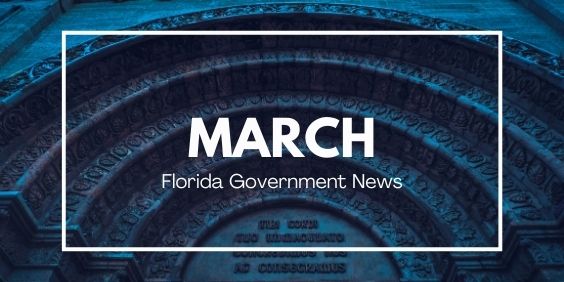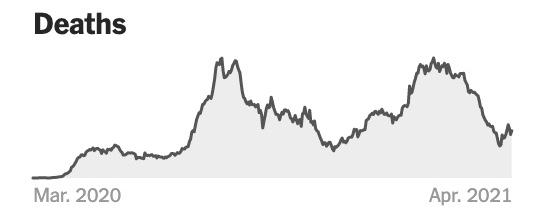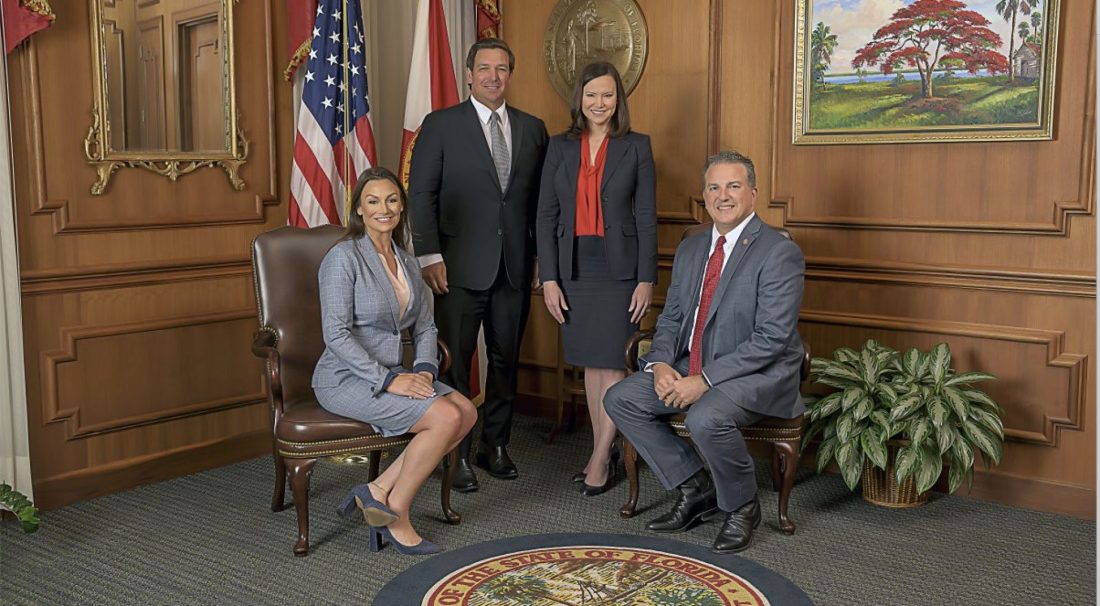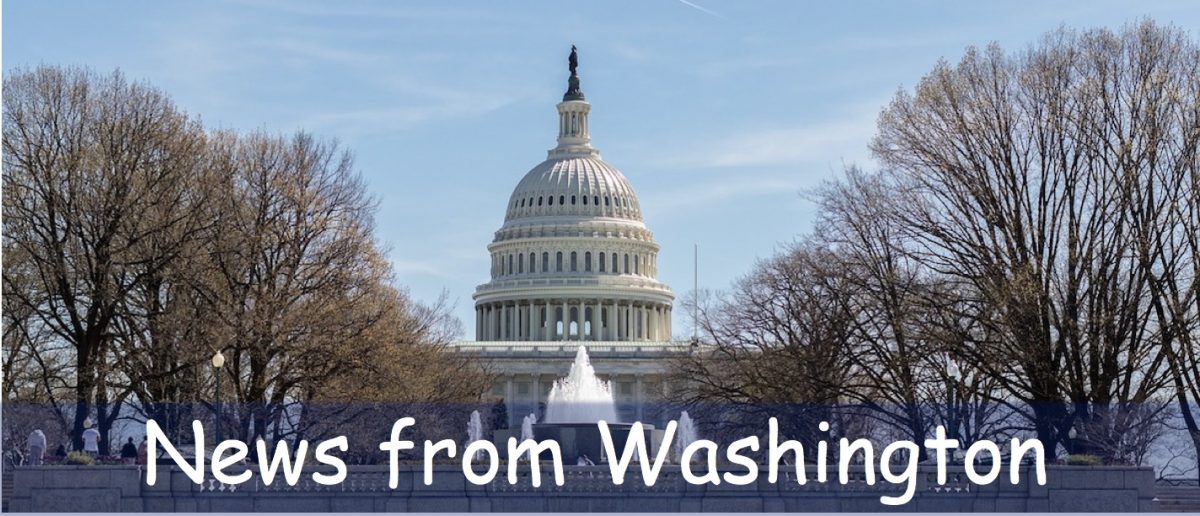
Last week marked the mid-point of the state’s 60-day legislative session. In this post, I’ll provide an update on the session and report on this month’s key votes by Florida’s U.S. senators. But with the state still experiencing the coronavirus pandemic, I’ll begin there.
COVID-19 News
Florida is the state furthest along in lifting restrictions, and scientists view it as a bellwether for the nation. (NYT).
The state has seen a 21 percent increase to 5,424 in the average number of coronavirus cases in the 14 days ended April 3 (NYT), compared to a 19 percent increase for the nation (NYT). The daily average for the last three days was 6,359. (FDOH)

Source: NYTimes, downloaded 4/4/21
Deaths, too, are on the rise.

Source: NYTimes downloaded 4/4/21
Variants of the virus reached 41 of Florida’s 67 counties (Orlando Sentinel) as of mid-March. Information about variant spread only became available after the Orlando Sentinel sued the state for withholding it.
Vaccine Update
Gov. Ron DeSantis expanded Florida residents’ eligibility for the coronavirus vaccine from age 65+ at the end of February to 40+ effective April 1. Effective April 5, eligibility will be granted based on the ages for which the vaccines have FDA approval: currently 16+ for the Pfizer vaccine and 18+ for the Moderna and J&J vaccines. (Executive Order; FDOH)
As of April 3, 30 percent of the state’s population had had at least one dose of a COVID-19 vaccine including 17 percent who were fully vaccinated (NYTimes).
Unemployment Update
Florida’s seasonally adjusted unemployment rate has fallen from its peak of 14.2 percent last May to 4.7 percent in February (FDEO), one-and-one-half percentage points below the national average.
As more people get vaccinated and employers gain the confidence to rehire, the state’s unemployment claims have fallen to the lowest level since the pandemic began. The claims backlog has fallen to just 35,000 out of the total 5.3 million processed claims, and 96.5 percent of eligible claimants have been paid. (FDEO)
An inspector general probe into Florida’s failed unemployment system found it was not prepared to handle even a modest amount of jobless claims, much less the historic number of claims that crushed it in the pandemic. (GovTech News)
State officials are asking lawmakers for more than $73 million (Associated Press) over the next two years to replace it.
2021 Legislative Session
I’ve said previously that the most significant public policy changes likely to come out of this session are in the areas of voting and election law, COVID-19 liability protection, anti-protest (aka anti-mob or anti-rioting) laws, consolidation of the state’s school scholarship (aka voucher) programs, and restrictions on large technology companies.
Those priorities were confirmed in one or more of the opening-of-session remarks by Gov. DeSantis, House Speaker Chris Sprowls, and Senate President Wilton Simpson on March 2.
Below is where each issue now stands.
Voting & Election Law
State legislatures across the country are passing laws to change voting and election procedures in direct response to experiences during 2020. Georgia’s new voting law has been much in the news; a NYTimes analysis of the 98-page law identified 16 provisions that will limit ballot access, potentially confuse voters and give more power to Republican lawmakers.
Florida’s election bills are Senate Bill 90 and House Bill 7041. SB 90 would eliminate drop boxes. HB 7041 would impose strict new ID requirements. Both would impact seniors and voters with disabilities (LWVFL) by severely limiting who can serve as designees to drop off vote-by-mail ballots.
Changes are certain. What they are will be negotiated in the remaining weeks of session.
COVID Liability Shield
The Civil Liability for Damages Relating to COVID-19 bill protects businesses, schools, nonprofits, religious institutions, and health care providers that make “good-faith efforts” to follow government health guidelines. It requires a plaintiff filing a COVID-19 lawsuit to prove with “clear and convincing evidence” that a defendant acted with “gross negligence.”
Proponents say the measure is necessary to shield businesses and medical providers from frivolous lawsuits and Florida’s sue-and-settle legal climate. It is supported by the Florida Chamber of Commerce and other business groups.
Critics, including the AFL-CIO and consumer advocates, say the legislation would mainly benefit the healthcare industry and corporations. They warn that workers whose COVID-19 injury claims are denied by workers’ compensation will lose access to the courts. Trial attorneys say the relative dearth of COVID-19 liability suits a year into the pandemic proves the legislation is unnecessary.
The fast-tracked bill passed both chambers largely along party lines. Described by House Speaker Sprowls as the “most aggressive COVID liability protection bill” in the nation (The Center Square | Florida), it is the only bill signed by the Governor so far this session.
Anti-Rioting Bill
In September, Gov. DeSantis announced what he later called the “strongest pro-law enforcement, anti-rioting, anti-looting legislation anywhere in the country.” He said it is necessary to maintain law and order because “professional agitators are bent on sowing disorder and causing mayhem in our cities.” (Press Release)
The Combating Public Disorder bill would create new criminal offenses and increase penalties for those who target law enforcement and participate in violent or disorderly assemblies.
Opponents, including the League of Women Voters of Florida and former Florida Supreme Court Justice Peggy Quince, say it would block First Amendment rights, doesn’t improve public safety, and is an attack on democracy. (WUSF).
It may be the most divisive bill facing lawmakers this session. (Sarasota Herald-Tribune). After passing the House along party, lines, the bill faces an uncertain fate in the Senate. (Associated Press)
School Voucher Programs
Florida has the biggest scholarship and voucher system in the nation. In the past few years, the Legislature has aggressively grown that initiative amid heavy criticism that the efforts were hurting traditional public education in the state. (Miami Herald)
This year’s proposals involve the use of education savings accounts that families could use to pay for children’s private schooling, therapy, or college savings. The House bill would keep the existing tax credit and Hope scholarships separate from the state’s budget system, with outside organizations to collect and manage the funds. The Senate plan would merge the existing five key scholarship programs and make them state-funded.
The House and Senate agree on expanding the voucher programs but not on how to get there. (Miami Herald) Differences will be worked out this month.
Restricting Big Tech
Gov. DeSantis explicitly cited the removal of the Parler app from the Apple and Google app stores and the permanent ban of former President Donald Trump on various social media platforms as the main motivation behind his proposed Transparency in Technology Act.
Florida is one of several states (Washington Examiner) taking the lead on regulating Big Tech platforms such as Facebook and Google, advancing rules regarding censorship, data privacy, algorithms, and advertisements.
Supporters say the measure is needed to protect Floridians from arbitrary sanctions from social media companies that have grown so large and dominate modern discourse. Opponents say it is likely unconstitutional because it infringes on the companies’ right to free speech by regulating the content they allow on their platform. (Orlando Sentinel)
The bill was passed in two of its three assigned House committees but has not yet been heard in the Senate.
The Budget
In the last week of March, the House and Senate Appropriations Committees released their budget proposals. The House proposal totals $97.1 billion and assumes a $4.4 billion federal funds infusion. The Senate proposal is $95.0 billion but does not include anticipated federal pandemic relief funds.
The current year budget is $92.3 billion, and Gov. DeSantis’ proposal is $96.6 billion.
The difference between the House and Senate budgets is almost entirely due to the House’s use of $2 billion in federal emergency education relief funding. Otherwise, the totals for the policy areas are very close. (Florida Tax Watch)
Floor consideration of the proposals begins this week.
Other Session News of Note
The Legislature passed the Sadowski Act in 1991 to create a trust fund to finance state and local affordable housing initiatives. The funding source for the Sadowski Fund is a documentary stamp tax paid on Florida real estate transactions.
Since 2000, GOP-led legislatures and governors have raided the trust fund of more than $2.3 billion to achieve balanced budgets, allowing the housing funds to go where the law said it should be spent in just 5 of those years. (Sarasota Herald-Tribune)
This year, Senate President Simpson and House Speaker Sprowls have proposed permanently shifting two-thirds of that funding to fund flood control and wastewater infrastructure.
“Appropriations of state housing funds are only a fraction of the dollars available to operate affordable housing programs,” according to the Senate President Office news release announcing the move. “While state [housing] spending has averaged $160 million annually over the past five years, available federal resources have averaged $542 million annually.”
Also:
- No-fault and other types of insurance could change in Florida. (Tampa Bay Times)
- Florida Senate votes to nix expensive toll roads through rural areas. (Tallahassee Democrat)
- Lawmakers earmark more of $1 billion online sales tax to another business tax cut. (News Service of Florida)
- House joins Senate in passing Civics Education bill. (Florida Politics)
Executive Branch

Attorney General Ashley Moody, Chief Financial Officer Jimmy Patronis
Cabinet Actions
For the past decade, felons in Florida have had to wait at least five years after being released from prison before becoming eligible to have their civil rights restored. This month, Gov. DeSantis and the Cabinet, acting as the Board of Executive Clemency, did away with the waiting periods and backed a plan to streamline the clemency for felons. (News Service of Florida)
Governor Ron DeSantis
- Orders local governments to cancel COVID fines. Palm Beach Post); Executive Order
- Wants legislature to use federal CARES money for civics lessons in schools barring ‘critical race theory.’ (WINK News)
- Pending ‘vaccine passport’ ban could pit individual rights against property rights. (The Center Square | Florida); Executive Order
Attorney General Ashley Moody
- Joins FTC, state agencies in shutting down scam charity telefunding operation. (Florida Daily)
- Files legal action to protect Floridians from President Biden’s dangerous immigration policies. (News Release)
- Takes action against nationwide debt collection agency over massive data breach. (News Release )
- Sues over tax cut ban in federal COVID-19 relief act. (Florida Politics)
Chief Financial Officer Jimmy Patronis
Commissioner of Agriculture Nikki Fried
Executive Branch Agencies
Judicial Branch
- Judge rejects lawsuit over Florida unemployment system. (News Service of Florida)
- Florida’s court system still struggling due to pandemic. (News4Jax.com)

To date, the Senate has confirmed 21 of 23 members (U.S. Senate) of President Biden’s Cabinet.
Sen. Scott supported 3 of them and opposed 18. Sen. Rubio supported 8 of them, opposed 11 and did not vote on 2. (Politico; Ballotpedia)
Key Votes
Extending paycheck protection program
Rubio — Yes; Scott — Yes
H.R. 1799 passed with vote of 92/7 on 3/25/21
COVID relief package
Rubio — No; Scott — no
HR 1319 passed with a vote of 50/49 (1 not voting) on 3/6/21
Other News
- Scott urges U.S. governors and mayors to return excess taxpayer dollars from COVID spending packages. (News Release)
- Florida’s senators go their own way in nominating federal judges for Biden. (Tampa Bay Times)
- Rubio backs Amazon workers’ union push, citing “culture war against working-class values.” (WSJ)
That’s it for Florida government news for March. The Legislative Session is scheduled to end April 30, and I’ll publish highlights soon after. Stay safe!
